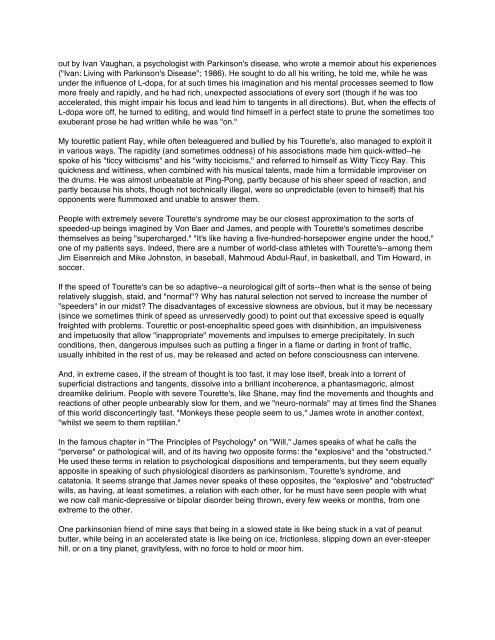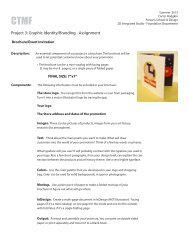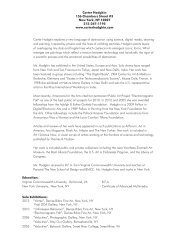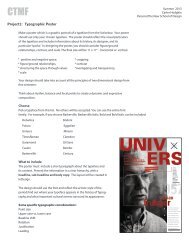Speed: Aberrations of Time and Movement Oliver ... - Carter Hodgkin
Speed: Aberrations of Time and Movement Oliver ... - Carter Hodgkin
Speed: Aberrations of Time and Movement Oliver ... - Carter Hodgkin
You also want an ePaper? Increase the reach of your titles
YUMPU automatically turns print PDFs into web optimized ePapers that Google loves.
out by Ivan Vaughan, a psychologist with Parkinson's disease, who wrote a memoir about his experiences("Ivan: Living with Parkinson's Disease"; 1986). He sought to do all his writing, he told me, while he wasunder the influence <strong>of</strong> L-dopa, for at such times his imagination <strong>and</strong> his mental processes seemed to flowmore freely <strong>and</strong> rapidly, <strong>and</strong> he had rich, unexpected associations <strong>of</strong> every sort (though if he was tooaccelerated, this might impair his focus <strong>and</strong> lead him to tangents in all directions). But, when the effects <strong>of</strong>L-dopa wore <strong>of</strong>f, he turned to editing, <strong>and</strong> would find himself in a perfect state to prune the sometimes tooexuberant prose he had written while he was "on."My tourettic patient Ray, while <strong>of</strong>ten beleaguered <strong>and</strong> bullied by his Tourette's, also managed to exploit itin various ways. The rapidity (<strong>and</strong> sometimes oddness) <strong>of</strong> his associations made him quick-witted--hespoke <strong>of</strong> his "ticcy witticisms" <strong>and</strong> his "witty ticcicisms," <strong>and</strong> referred to himself as Witty Ticcy Ray. Thisquickness <strong>and</strong> wittiness, when combined with his musical talents, made him a formidable improviser onthe drums. He was almost unbeatable at Ping-Pong, partly because <strong>of</strong> his sheer speed <strong>of</strong> reaction, <strong>and</strong>partly because his shots, though not technically illegal, were so unpredictable (even to himself) that hisopponents were flummoxed <strong>and</strong> unable to answer them.People with extremely severe Tourette's syndrome may be our closest approximation to the sorts <strong>of</strong>speeded-up beings imagined by Von Baer <strong>and</strong> James, <strong>and</strong> people with Tourette's sometimes describethemselves as being "supercharged." "It's like having a five-hundred-horsepower engine under the hood,"one <strong>of</strong> my patients says. Indeed, there are a number <strong>of</strong> world-class athletes with Tourette's--among themJim Eisenreich <strong>and</strong> Mike Johnston, in baseball, Mahmoud Abdul-Rauf, in basketball, <strong>and</strong> Tim Howard, insoccer.If the speed <strong>of</strong> Tourette's can be so adaptive--a neurological gift <strong>of</strong> sorts--then what is the sense <strong>of</strong> beingrelatively sluggish, staid, <strong>and</strong> "normal"? Why has natural selection not served to increase the number <strong>of</strong>"speeders" in our midst? The disadvantages <strong>of</strong> excessive slowness are obvious, but it may be necessary(since we sometimes think <strong>of</strong> speed as unreservedly good) to point out that excessive speed is equallyfreighted with problems. Tourettic or post-encephalitic speed goes with disinhibition, an impulsiveness<strong>and</strong> impetuosity that allow "inappropriate" movements <strong>and</strong> impulses to emerge precipitately. In suchconditions, then, dangerous impulses such as putting a finger in a flame or darting in front <strong>of</strong> traffic,usually inhibited in the rest <strong>of</strong> us, may be released <strong>and</strong> acted on before consciousness can intervene.And, in extreme cases, if the stream <strong>of</strong> thought is too fast, it may lose itself, break into a torrent <strong>of</strong>superficial distractions <strong>and</strong> tangents, dissolve into a brilliant incoherence, a phantasmagoric, almostdreamlike delirium. People with severe Tourette's, like Shane, may find the movements <strong>and</strong> thoughts <strong>and</strong>reactions <strong>of</strong> other people unbearably slow for them, <strong>and</strong> we "neuro-normals" may at times find the Shanes<strong>of</strong> this world disconcertingly fast. "Monkeys these people seem to us," James wrote in another context,"whilst we seem to them reptilian."In the famous chapter in "The Principles <strong>of</strong> Psychology" on "Will," James speaks <strong>of</strong> what he calls the"perverse" or pathological will, <strong>and</strong> <strong>of</strong> its having two opposite forms: the "explosive" <strong>and</strong> the "obstructed."He used these terms in relation to psychological dispositions <strong>and</strong> temperaments, but they seem equallyapposite in speaking <strong>of</strong> such physiological disorders as parkinsonism, Tourette's syndrome, <strong>and</strong>catatonia. It seems strange that James never speaks <strong>of</strong> these opposites, the "explosive" <strong>and</strong> "obstructed"wills, as having, at least sometimes, a relation with each other, for he must have seen people with whatwe now call manic-depressive or bipolar disorder being thrown, every few weeks or months, from oneextreme to the other.One parkinsonian friend <strong>of</strong> mine says that being in a slowed state is like being stuck in a vat <strong>of</strong> peanutbutter, while being in an accelerated state is like being on ice, frictionless, slipping down an ever-steeperhill, or on a tiny planet, gravityless, with no force to hold or moor him.







